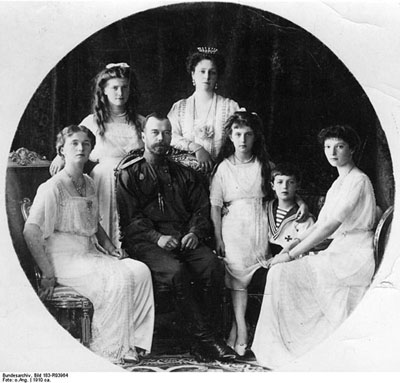The great tragedy of Science is the slaying of a beautiful hypothesis by an ugly fact. – Thomas Huxley
The recent news of scientists identifying the bodies of Tsar Nicholas II’s missing children, confirms they were executed in 1918 and ends nearly a century of fanciful stories and speculation about the possibility of his youngest daughter, Anastasia, escaping the rest of the family’s fate. A woman in Charlottesville claiming to be Anastasia was really just crazy, and the imaginative, lovable 1997 Don Bluth film romanticizing her life is now overcome with this grim reality.
 Nicholas II with his wife, four daughters and son (1910) |
Science has a long, distinguished history of taking beautiful ideas and smashing them to bits. Take, for instance, Zeno’s Paradox, which states that in order for a person to walk from point A to point B, they must cross point C, halfway between them, and point D, halfway between A and C, and point E, halfway between A and D, on and on until a person must cross an infinite number of points to get to B. How are we able to travel through space if we must cross an chasm of infinity to go anywhere?
 Zeno’s Paradox |
More than 2,000 years after the question was posed, calculus solved it. As the points a person must cross approaches infinity, the distances between them grows infinitely small; thus, an entire school of philosophical thought was rendered irrelevant.
As are so many other seemingly profound questions. Nature or Nurture? It’s both. The plasticity is innate, and the innateness is dynamic. Which came first, the chicken or the egg? They co-evolved. Next question. Did Adam and Eve have navals? Mitochondrial Eve did. Now shut up and sit down.
This slaying of fanciful ideas makes science out as a villain of sorts, crushing the dreams and aspirations of great thinkers. This characteristic of science contributes to the Two Cultures Divide between the sciences and the humanities, where the scientist stereotype finds the humanities stereotype ungrounded in reality and the humanities stereotype finds the scientist stereotype cold and unimaginative. Science always seems to be telling the humanities people what isn’t possible.
But that’s just the stereo type. The reality is that science has expanded our horizons, opened more doors of possibility than it has close. One need only compare science fiction literature to fantasy to see that this is true. Science has shown us the edge of the Universe, given us vitual worlds, extended our lifespans and our horizons. When we abandon our fanciful notions, science rewards us with more inspiring visions.
Comments
4 responses to “Science Slaying Beautiful Hypotheses”